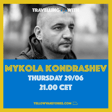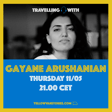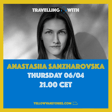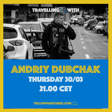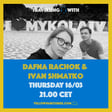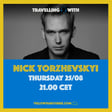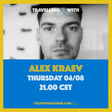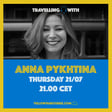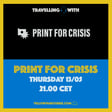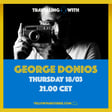Progress and Challenges in Ukraine's Defense
00:00:03
Speaker
I know that a lot of hard work has been done and has to be done, but the Ukraine in general is moving in the right direction. Hello and welcome to a new episode of the Yellow Van Stories. We are so happy and grateful that you have made the time to come on board with us today. I'm your host and driver Bastian. We've been waiting just for you and kept your usual seat by the window side.
00:00:33
Speaker
After Russia's invasion of Ukraine, the topic of the second season became very clear to us. We decided to invite Ukrainians into the van to share their stories with us and to learn more about Ukraine's cultural identity, because too often it has been appropriated by a chauvinistic Russian narrative. The same narrative that is now serving as a pretense to the war. Supporting Ukraine, in our opinion, therefore has a very strong cultural dimension as
Interview with Oleksi Marzieniuk
00:01:01
Speaker
In today's episode though our focus won't be a cultural one as we have a former deputy minister of defense with us who after now five months of the ongoing war in Ukraine will share his impressions with us and his outlook for the future. Fonzi is in first gear already and we are good to go. So buckle up and sit back because today we're going to meet Oleksi in Chernitsi.
00:01:33
Speaker
Hello and welcome to a new episode of the Yellow Van Stories. Here with us in the Yellow Van today is Oleksi Marzieniuk, who is the Executive Director of the Center for Defense Strategies in Kiev, an organization that helps to monitor defense reforms and develop key government policies that will affect the country's security and defense sector. Now, that's already a mouthful and we will get into that in detail. Thanks so much for being here with us, Oleksi. Very happy to have you on board. Thanks for hearing me.
00:02:03
Speaker
It's a great pleasure having you and especially because the way that it all came together is also very interesting and very nice. There's a very special touch to today's meeting and I will mention that also in the introduction that I will give to you a little further along the way. But first of all, I would like to know where are you right now?
Geographical and Cultural Context of Ukraine
00:02:28
Speaker
I'm in Ukraine. To be more precise, I'm in my hometown of Chernivtsi, which is like Western Ukraine near the border with Romanian Moldova. And it's approximately 500 kilometers from Kiev, which is the capital of Ukraine.
00:02:48
Speaker
Can you explain a little bit what the situation is in Cerny Hif at the moment? Did I say that right? I really struggled. You pronounce it correctly, except the city is wrong.
00:03:03
Speaker
So there are two cities with similarly sounding, which is like Chernivtsi, this is where I am, which is my native place, and Cherniv. Cherniv is like North Kiev, it's like two hours drive or something. Actually very historic city, I've been there, it suffered a lot through this ongoing war.
00:03:27
Speaker
But yeah, but luckily I'm not there I'm a bit in a different direction. So I'm very close to the border with the European Union namely with Romania
00:03:39
Speaker
But also Hungarian border is not far away. Polish border is a bit more far away. It's difficult to describe geography with words. You have to look at the map and then you're like, okay, guys, stop talking. I know what you meant.
00:03:59
Speaker
I will just link to a very big Ukrainian map in the show notes. That's what I'll do. I'll just put a very big, big Ukrainian map in the show notes and then everybody can just take a look for themselves. I think that's the easiest. So what I would like to do, I would like to actually introduce you a little better to understand what it is that you do and also to understand a little bit the relationship that we have with each other because we have known each other for, we figured out the other day, almost 17 years now, 18 years, I think.
00:04:25
Speaker
And it's so wonderful to get back in touch also through the podcast now. So I'm just going to read out a little bit of an introduction, a little CV, and then we'll dive right into our conversation. Okay.
Oleksi's Background and Personal Experiences
00:04:40
Speaker
Thank you very much.
00:04:57
Speaker
And we will get into that in the course of the podcast, of course. And also, which is quite important, you served as a civilian deputy minister in the Ukrainian Ministry of Defense for almost a year. But before then, originally, Alexei has a business background. And because of this, Alexei's and my relationship actually goes way back. When I studied photography in Ghent in Belgium at the end of my first year, all students had to choose a topic and project outside the curriculum
00:05:26
Speaker
and entirely self-sufficient and motivated by our own interests. And this is now almost, like I said, 17, 18 years ago, I think. And as a foreigner myself, I chose the topic of migration and opted to take black and white portraits of people far away from home in Belgium. And I put it all in book form, presenting them on a double page with their portrait in black and white and one page of the most cherished and valuable photo in color that they brought with them.
00:05:55
Speaker
And Alexei was introduced to me by my dear friend, Apoorva, who studied with him at the time. And at this point, I have to give a big shout out to Apoorva and a greeting and a big hug. And I see him far too seldom. We're thinking of you, Apoorva. And thank you so much for introducing us back then.
00:06:16
Speaker
And really one thing is I remember the portrait of Alexei still so well after all these years, because standing in his rather modest and empty student cave, but with a big bright Ukrainian flag on his wall. I remember that so well. And leaning in, this was your facial expression, curiously observing me with a gentle smile while I was trying to create something lasting with the little that I knew at the time of photography. But in a way, I have, because by having you with me today,
00:06:45
Speaker
18 years after that photo was taken, there definitely was something in there that lasted. So I'm very happy and very grateful to have you with us today, Alexey, after all this time. And I look very much forward to the conversation that we're having. Thank you so much. Awesome. Thanks. And yeah, it's great. Actually, this is my first podcast where I am a guest.
00:07:10
Speaker
Well, actually the first podcast ever where I'm actively participating. How do you feel about that?
00:07:19
Speaker
Actually, it's excited. I don't have any tremor or whatever. I'm just feeling good. Maybe because I know you and you're not some random guy who just asks tough questions or whatever. But I don't know what to expect, by the way. Who knows? Maybe you change. You don't know. They're going to be tough questions. Maybe those questions are very tough. You don't know yet.
00:07:47
Speaker
Let's just see. Yeah, yeah. I prefer not to know that in advance so that I don't have extra pressure.
00:07:54
Speaker
That is the very best attitude, actually, exactly. Just take it as it comes. I agree with that. Ignorance is a beast. Oh, it can absolutely be. I always have to think of the matrix because that sentence, when he takes a bite of the juicy steak on his plate, is just what always comes to my mind with that sentence. Ignorance is bliss. But it proves that point very much, I believe.
00:08:21
Speaker
Um, so I just want to start off with you a little bit about, um, about your life at the moment, you know, some, like some insights into your private life as well. Uh, as much as you're comfortable with, of course, you know, I'm not, I'm not, uh, I don't want to invade it anyway, but, uh, I know for instance that you've become a dad, uh, and congratulations, uh, first of all, uh, for becoming a dad for the third time, right?
00:08:47
Speaker
Correct. Yes. Yes third time. It's a boy. It's my second boy. I have boy daughter boy and Sorry son we Got you we got you. Yes. Yes. Yes. It's very important clarification. Yes, very important clarification Yeah, so basically
00:09:14
Speaker
He was born on the 19th of March, so at the height of the battle for Kiev. And the Kiev was actually where my family used to live, used to reside. So we do come to Chernimtsi every summer.
00:09:36
Speaker
over the last six years or so, so we do spend considerable amount of time in my hometown. But basically, the school and everything is in Kiev, so this is where we were on the 24th of February when the full-scale invasion started.
Analysis of Russia's Strategy
00:09:59
Speaker
I remember that moment very well.
00:10:02
Speaker
Because, well, working in this think tank, we obviously sort of analyzed different scenarios of what can happen in terms of security situation. And basically, the analysis that we produced and the various kind of research sort of showed us that
00:10:31
Speaker
Basically, Putin wasn't 100% prepared for that full-scale offensive. We saw that, okay, there was a lot of troops, that they were really planning something bad.
00:10:51
Speaker
And for months, right? They had been assembling on the borders. Actually, the first time our center analyzed the situation was actually a year ago, because the first escalation took place in April, like April, May, I guess, in spring 2021, which is like a year ago, and there we analyzed. And at that time, the readiness of his forces was
00:11:18
Speaker
much less than in February. But even in February, it was still far from actually being ready for something really, really strong.
00:11:34
Speaker
So basically we analyze it. I mean, I won't go much into details how we did that, but actually you can have intelligence, we can read intelligence report about how many trucks, how many medical, how many logistical units you have, et cetera, et cetera. And that was pointing to the fact that probably a wise military commander
00:12:03
Speaker
would not start that. But at the same time, we obviously understood that there may be some irrational moments. So moments that could not be explained by logic, we understood that Putin can be living in an informational bubble. So he may have a distorted view of what's what the situation is. So and obviously he can just be reckless and go ahead.
00:12:33
Speaker
But again, there was also high probability that this could be a big bluff. But at the same time, yeah, we sort of- But an expensive bluff, right?
Oleksi's Decision to Leave Kiev
00:12:47
Speaker
Yeah, of course. But you know, for them, it's, okay, it's expense is, well, they stole enough money to kind of
00:13:00
Speaker
And they care too little about the well-being of their people. So the money is like not really an obstacle. So if you say, okay, it's expensive, let's not do it, that would not count to them. So they could still go ahead and then they did.
00:13:15
Speaker
But on the eve of this invasion, on the 23rd, I spoke to one of the clients because we do some consulting for clients like defense and security consulting. And I told him that, so look, our analysis is still the same that actually, there are no prerequisites for successful
00:13:42
Speaker
full-scale invasion and holding of the territory. But we don't know, so please don't turn off your phone at night, because I might call. I don't know, because I'll be monitoring situation. I have a habit of waking up at the middle of the night and then checking things, and then I would go to bed again. So I woke up at 4 a.m.,
00:14:10
Speaker
And I checked the news. And as I was checking the news, I heard blasts outside of my window. So which were like... This was the morning of the 24th? Yeah. The morning of the 24th of February. Yes, yes, yes. The day of the invasion. And so it wasn't like the blast of the missile heat or anything. It was the blast of the air defense, but still...
00:14:38
Speaker
I understood that it started, and then the news just confirmed it, that Putin officially announced his operation. I mean, basically, he started the war, the full-scale war. It's important to note that this is not just the start of the war, it's just the start of the full-scale war, so full-scale invasion.
00:15:03
Speaker
Yeah, so then I woke up my pregnant wife and I said that we really need to go because obviously if Kiev is attacked, that means that it's not safe to give birth here in Kiev. And so we packed whatever we could within a very short time.
00:15:26
Speaker
and took the kids and we kind of traveled, we went out. So it took us about six hours to get out of the city. And- By car, right? By car, yeah, by car. We went to her parents who live just like 90 kilometers outside Kia, we went there. And yeah, so my goal was to place them in safety.
00:15:55
Speaker
And then I returned, I returned the next day to Kiev. So this is, and yeah, so after that, we actually took even harsher decision that we need to go to Chechnitzi and to have labor here.
00:16:15
Speaker
And this is what actually happened. So yeah. So you're still in charity now and you still commute between charity and Keith? Is that basically what you're doing now? Days ago. And Keith is actually, yeah, if during the day it looks safe.
00:16:36
Speaker
So it's like you wouldn't say there's war going on in this country.
Life in Ukraine Amidst War
00:16:40
Speaker
Like it looks safe, you know, people chat, smile, walk, the stores are open, the cafe, public transportation, beaches, like there is like quite a few nice kind of summer beaches in Kia where you can like make like do some sunbathing and
00:17:01
Speaker
Get some time. They're all operational also and open and accessible now and give you We didn't the mines were the beaches were not mined so they were not my like as in Odessa for instance because in Odessa that's like really dangerous because they obviously so give is less susceptible for
00:17:25
Speaker
for kind of amphibious operations. And the beaches that are in Kiev that, you know, they don't lead to anywhere important. So it's, it's like pointless to do an amphibious and pray like an amphibious landing on that beach because it's just like, like, okay, you land and then what do you do next? It's like, you just landed on some island, like,
00:17:50
Speaker
No marital purpose. But also in Odessa, I've seen reports now lately that in Odessa actually also, during the day life is very, it seems very normal. It seems very normal. I mean, obviously people are distressed and I think the main tactics that we have seen also by, and correct me with anything that you feel I'm saying wrong or I don't have a good view of because you are obviously an expert in these things and I am not at all.
00:18:16
Speaker
But the tactics of the Russian military are also to just... It's terrorism, right? It's like this normality of life is accessible. It's in your grasp. But you never know when the next missile might strike a shopping mall or something like that, right? So I think this is... Would you consider this as a standing tactics of the Russian army in this full-scale invasion, in this war?
00:18:44
Speaker
This is absolutely touristic tactics. So they do scare the population. So they want people to be afraid to tremble, to beg for peace. And this is why you see those many civilian targets being hit.
00:19:14
Speaker
And even if they're hit by mistake, they're okay with it. So they say, okay, if we miss...
00:19:22
Speaker
And we hit something civilian instead of military target. Yes. That's okay. So basically, I want to increase, I think, the way that I see it, increase the internal pressure in Ukraine from the population to at some point go, you know, settle for peace to their own government, because they just wanted to be over with. So they have the military pressure on the one hand, and they want to increase the public pressure as well to maybe settle for a peace that is not in
00:19:50
Speaker
the best interest of Ukraine necessarily. Would you agree with that if I put it this way? Yeah, that's definitely what Russians would want to do. Whether they succeed with that is another question, right? Yes. This is definitely what they want to do. Basically, because the definition of terrorism is that you really want to frighten people. You want to get them scared.
00:20:21
Speaker
And when you're scared, you sort of, you can accept conditions. They're like really, really, really terroristic thing. That's why actually there is a very strong push to recognize Russia as either like state sponsor of terrorism or terrorist state, whatever. Both will work and both should work. This is the fact.
00:20:48
Speaker
Now, having said this is the tactics and this is the intention, the other question is also, but will that work? And from what we have seen in Ukraine, actually it's doing the opposite. I think Ukraine, and also again, I'm just paraphrasing things that I hear, read about. You obviously have a much better view than I, so I encourage you to
00:21:09
Speaker
correct me or add on to what I'm saying at any given moment.
Strengthening of National Identity
00:21:13
Speaker
But it seems to me that the actual effect is a different one, namely that Ukraine is actually moving closer together than ever before through this outside pressure, rather than being split internally as well and to settle for peace more quickly because of this terrorism. Is that an observation that you're also making? That Ukraine is actually as a state, closer than ever before?
00:21:38
Speaker
Yeah, yeah. So if we talk about like Ukrainian people, it's obviously that they actually experiencing as like something totally opposite to what Russia is intending to do. You are right in saying that it actually makes people more willing to win.
00:22:02
Speaker
and to reach peace on the winning terms from our side. That's how I would put it. Is this also in that sense a very important moment then actually also in the nation-building process of Ukraine in that sense, according to you? Of course. There's a joke that one day they will place a very small monument
00:22:31
Speaker
to Putin in the basement of Secret Service of Ukraine for uniting the nation. Actually, it's just a very, very interesting highlight that the survivors of the butcher, we heard the butcher feelings,
00:22:57
Speaker
Just in case you haven't heard about Bucher. Bucher is a suburb of Kiev, and there is undeniable evidence that when Russian troops withdrew from there, that civilians were killed by the dozens in cold blood. And this is something that did happen in a lot of other Ukrainian places as well. I have compiled a list of articles in the show notes for you to get an overview for yourself. And now back to Alexey. So as from what I read,
00:23:27
Speaker
They actually, they have a very strong resolve to win. So they are not begging for peace. Their survival actually led them to be more persistent in kind of winning this over this evil. In a way, this is what I come across a lot as well, though, that Butcher is a great example, also Mikolayev, and a lot of other places.
00:23:55
Speaker
that who have seen like the greatest atrocities that some of them are the most determinable to just not let this influence their spirit in any kind of way and actually makes them even more determined to stand in the way of this Russian imperialism. It's just my observation but what I observe is that I haven't seen, I haven't heard like
00:24:20
Speaker
like voices that would say, okay, it's better that we have had surrender, even from Mariupol. So the people I know from Mariupol, they didn't say that. So they don't say it like, best would have been if we had surrender, no. But I mean, obviously, they exist because look,
00:24:47
Speaker
Let's take into account that many people were forcefully or voluntarily taken to Russia. So we don't hear their voices there. Or if we do, we hear some distorted voices or maybe they're generally, generally believe that it was best just to give up and I don't know. But overall, what I observe is that
00:25:13
Speaker
the sources which I follow, they will know such mentions that, okay, it would be best to surrender and let them do whatever, no. So the resolve, the resolve is there. So we don't see much information from the territories that are currently occupied, but we're not ready. No hands can done yet. No, not like Harrison.
00:25:43
Speaker
Ah, Herson and... Mariu, as well. They did it. There's a big difference between Herson, Bucia and Marupo. So Bucia wasn't bombarded. So there were heavy fighting, but these were street fighting.
00:26:02
Speaker
Yeah, and many people were they were like killed But they were killed not by shelling they were killed by by the internet in general. So without There was a period that was there was like quite a few weeks that Actually, there were no talk about retreating. So so and the most killings were like happened actually during that period whereas in mario ball so that was like
00:26:32
Speaker
simply bombardment. So they were just shelling indiscriminate shelling. So basically, that obviously a different story. And in her son, that was just occupation. So they occupied and they mostly didn't touch. So there was some repressions, some kidnapping, etc. Well, not some, it was still quite massive. But overall, the people didn't
00:26:59
Speaker
didn't suffer the full extent of the horrors of the war, as people in Marupal did, and as people in Busha. But still, Busha is... I sort of separate those two cases, like Busha European and Marupal. This makes sense. It makes sense. Also, from the criminology point of view, this is different.
00:27:27
Speaker
No, I think you've made a very good distinction, actually, between the three cities.
Complex War Narratives
00:27:32
Speaker
I think very well, also for me, because it's true. There's a big difference. Also, because Bucher, for instance, now you had the first trial for war crimes. Because you can actually, the killing, you can trace it back to single individual soldiers, right? In Mariupol, it will be very difficult. And in Hjersón, it is also a different story. And I think you made the distinction very, very well there. And I think it's very easy to follow that.
00:27:57
Speaker
So I would but obviously you know this is also it's not always as black and white as you would have it in a conversation like this and there are a lot of things leading to each other and I would like to maybe if I can with my limited capabilities to just
00:28:11
Speaker
stretch it out a little bit further. But before we do that, I would just like to, because this is what we started off with, I just ask you what it's like. You've just become a dad for the third time. You have a family. You're living in Ukraine. On a private level, what is it like to have a son born into these times? What does it do with you?
00:28:35
Speaker
It's difficult to compare. Obviously, my daughter was born in 2016, which was, I would say, a relatively peaceful time. There were some
00:28:54
Speaker
positional fighting like trench war in Donbas But you like you wouldn't feel it anywhere else in Ukraine. So it was just okay So nothing's happening very isolated incidents basically. Yeah, so so Whereas my first son my oldest son he was born here like in the in the Advance of Maidan
00:29:24
Speaker
It was born like in like at the end of 2012. And when my down happened, you know, you know what I'm talking about. Yes, we asked the president. Yanukovych when he fled the country. So, you know, and both with him, both at that time, and now I had, I had this feeling that, okay, okay, so this does not come for granted, you know, I have to fight.
00:29:52
Speaker
I have to do something to make sure that basically they have the country to them. And you know, with the newborn one, it's easier because my oldest son, Alexei Jr., he
00:30:22
Speaker
He grew up like Ukraine, so he doesn't know any other reality except the reality in which Ukraine is independent state, Kiev is the capital, we belong to the European family, we are free country, we are like...
00:30:40
Speaker
We like to do business we open me like everyone has the right to speak out etc etc etc so he has no other reality than that so basically it's actually i think that all my.
00:30:57
Speaker
all my stance towards defending the country is actually defending it more for the older son. Because the newborn, he doesn't understand anything. But obviously, okay, when he grows up, he will understand it, but it will be a bit later. But for now, my biggest
00:31:21
Speaker
motivation I have at the moment is actually defending the country. I mean, working for the victory for the sake of Alexei Jr. and my daughter Oriana, because they are experiencing it.
00:31:38
Speaker
They know that Putin is who he was. They know that Russia is the new reality. So we have Russians, we have Russian fascists, Nazis.
00:31:54
Speaker
who really want to exterminate. So and, you know, as Golda Mayer, who was born in Keio, by the way, and he was Prime Minister of Israel at very, yeah, he was actually, I, our, our apartment is not, not far from where she was born, like physically. So, and then she said, like, again,
00:32:18
Speaker
So we want to leave, our neighbors want us to die.
Oleksi's Personal Reflections and Motivation
00:32:23
Speaker
So there is not much kind of in between. So that's same here. I'll tell you the story that when analyzing, now I'm back to being the executive director or a think tank. So not just a father.
00:32:42
Speaker
But wait, before you move to that, let me just ask you. So your son being born now, does that increase your resolve in a way? Does it not really change much in your perception of the country and what needs to be done? Or has it also that impact on you that you think now you have even more reason to defend Ukraine against this invasion?
00:33:04
Speaker
Well, that adds, but like, I wouldn't say that it adds significantly again, because he won't share this result with me, whereas the other two kids, they can, so that they show the result to defend. So I'm like, we're like, join, we're like small, small platoon, like, together that we're like, okay, we know that we have to defend it, we know that
00:33:29
Speaker
The situation is very tough and nothing has decided yet. How is it for your other kids though? Because they know, like you said, just now they know Ukraine like this, like this sovereign entity that it is and has been. How are they dealing with this war? How is it for them? Do they ask a lot of questions from you? Well, it's not that they're asking questions of
00:33:59
Speaker
I mean, what's what's happening, they are totally, totally aware that there is a fight that people die. And that, you know, we have to fight that. So but it's not that I mean, they do ask some questions, like, obviously, so but these are, these are more like clarification questions. So I think they're, for their age,
00:34:29
Speaker
they are quite familiar with because we had, we have, we had the refugees. We still have some, well, like people who, who had to change their residence and they leave like next to us or like, uh, all right. And, uh, and actually we made very good friends with them. And then they know that they had to leave.
00:34:51
Speaker
their places because of the war. And so they, they know it. They, they understand that there are people who suffered a lot. They understand that. So, and so for them, it's like, I think it's pretty much clear. So they, they just live in the reality of where there is an aggressor who wants to destroy us and we have to fight them back.
00:35:17
Speaker
But you have your family routine, even though it's now a little different because you're in genetes and you travel to Kiev a little more, there's probably a little more commuting. But in general, you have your family routine and that's like a life like it was before the war. That's the bottom line that I want to know and understand a little better.
00:35:38
Speaker
No, the routine is the same, but the perspectives are different because like, we made decision that they will not go to school in Kiev. So as of September, starting as of September, they will go to school here. So it's a different story for them. And for my daughter, she goes to like, this is her first year in school and
00:36:05
Speaker
She and she will start school here. So before she was going to kindergarten like in Kiev but like this year is it's changing for and I Don't know how important this for them that it's changed because of the war. I Don't know like I can't answer like if they make this distinguished this distinction and if if it matters to them a lot but
00:36:35
Speaker
So, you know, we, speaking of me, what has changed since the war, we're actually, we've been lucky in the sense that the journey wasn't affected much. So, we do also have like air raid sirens, we have some kind of,
00:36:59
Speaker
patrols, curfew, etc. So we do experience that. We read the news, we understand that there are some cuts to the city budget because of the war. But this is how we are affected.
00:37:20
Speaker
But I don't know if that answers your question. No, it does. I think it's also, you know, obviously, this is also like most things. You are in it also, so it's sometimes also not so easy to reflect. You know, obviously, things change a little bit or more. For me, it's just a question of understanding, you know, because I don't have that perspective and I hope that nobody will have to have that perspective ever.
00:37:48
Speaker
what it's like to be in a country that's at war, right? And also to be quite honest with you, it is one of my biggest fears to ever be involved in a war, to have to face down literally the barrel of a gun. So that's why I'm interested in how it changes and I do believe there is not a single answer. So yes, you answer my question. Thank you very much also for going down. I can tell you one extra thing that actually what changes is that you
00:38:19
Speaker
It's typically what average family thinks, even in Ukraine as well. Typical family thinks, okay, where do we go this autumn, for instance? Or where do we go? Where do we go on vacation? Don't have that anymore. So I'm not interested to go on vacation. I'm like, screwed. I don't want to go see new places because who do I share this emotions with? Who do I share this experience with?
00:38:48
Speaker
with people who are in trenches or people who had their limbs cut off by the blast or like, how do I enjoy these experiences? And so there is like the horizons of what you can plan or what you want to achieve. They suddenly are replaced with the desire for victory.
00:39:18
Speaker
victory and the forthcoming peace, you know. So this is what changed. This is probably the most profound change that your desires
00:39:34
Speaker
they are shifted heavily to the desire of peace. So basically, you may still desire to go to, I don't know, Madera or whatever, the location, but you first want peace for that to happen.
00:39:52
Speaker
I think that's relating very strongly to me in that sense, yes. First of all, it has this social dimension that you just said, who you want to share it with. I think that makes a very strong impression on me, at least. Thank you, Alexei.
00:40:13
Speaker
So now that we have also looked at that, I would also like to go a little deeper into your position and go into a little more depth of some of the analyses you've also already shared with us and some of the outlooks. But first of all, I would like to ask you, maybe you can describe to us a little bit shift from finance to
Shift from Finance to Defense
00:40:35
Speaker
war. Can you describe the journey a little bit? How did that come about?
00:40:39
Speaker
Because you started off with, you have an MBA in business, business economics, MBA business, business, or just business? Maybe it's one of the same. Businesses. Business economics business. It shows again how ignorant I am. Ignorance is bliss, right? This is how we started off this podcast. Yeah, so you have an MBA in business and how did you end up where you are now? Describe that, if you please.
00:41:09
Speaker
I really was in investments for pretty much like 15 years. Yeah, pretty much 15. So after I graduated in 2004 from business school, investments I was busy with. So I worked in investment fund, investment banking, investment office for some like high wealth individuals, et cetera. Yeah, but then, yeah, a friend of mine,
00:41:39
Speaker
He became a defense minister of Ukraine, the defense minister of Ukraine. Not a deputy, but the defense minister. The defense, yeah. He became the defense minister, like was very unexpected and it was really welcome thing because we met, we knew each other because I once
00:41:59
Speaker
I analyzed his business because like a rich person like a like a take on who i work for. He was interested in buying this friends enterprise so not really buying but investing.
00:42:15
Speaker
And then when the first war took place in 2004, he got very concerned. He became a very active volunteer. So he would do a lot of things for the army as an activist. And then he actually would
00:42:44
Speaker
launched a reform's office for the Ministry of Defense. He was the director for the reform's office, so he was doing a lot of reform projects for the Ministry of Defense. Is this an appointed position?
00:43:04
Speaker
How to explain so basically so Anyone who works for the Ministry of Defense is either a military person or a civil servant. So it's a special special kind of social status then But then the reform office was like some some sort of form of
00:43:30
Speaker
civic military cooperation. So where you have like activists who are financed by some like donors, like UK, the United Kingdom, for instance, or the US or Canada, essentially, he worked, he was financed by some foreign aid.
00:43:53
Speaker
But he was very closely connected with the Ministry of Defense. So their office was in the same kind of building. So so obviously they didn't have like, like classified access, etc. So they were, they were doing some like, different, mostly civil things. Like, for instance, the supply of food for the army. So how how to do that properly, etc.
00:44:19
Speaker
how to do the non-weapon procurements properly because the corruption still could be very high, but at that time it was enormous. So Ukraine became so weak in 2004 that basically they couldn't withstand the first Russian invasion and annexation. A lot because of the corruption that
00:44:47
Speaker
sort of the, that a lot of money went to the army, but it was all stolen. By the time it reached its final destination, it was almost up. He did a lot of reform. And that's why when Zelensky became president, so he was basically
00:45:10
Speaker
pointed that to the landscape that this could be a good guy, like a proper civil defense minister, because like, modern standards, like modern NATO standards, et cetera, they sort of require the army to be overseen by like, by civil authority. Yeah, so like, this is called the civil domestic,
00:45:39
Speaker
democratic oversight, civil democratic oversight. And so so it's important that like a defense ministry is not a military person, but a civil person, but which still has understanding of how military work is. Otherwise, you have like two generals who think who like compete with each other. One is like the Minister of Defense. The other is the commander in chief.
00:46:07
Speaker
And they compete who is the bigger commander. A good and terrible example of what happens to a military without civil oversight is Germany after the First World War. In order to call out the Republic, the Social Democratic leadership in Germany at the time with Philipp Scheidemann and Friedrich Ebert, they had to be sure that the army wouldn't interfere.
00:46:33
Speaker
and therefore they guaranteed them to leave the army untouched if they would have their backing. But without the necessary democratic reforms, the army stayed a state within the state, following its own agenda.
00:46:48
Speaker
and holding mostly authoritarian positions, they finally supported Hitler and were a very deciding factor in his eventual rise to power, rather than protect the democratic constitution that they were sworn to uphold. I have linked to relevant articles in the show notes. Now on with Alexey. So did this friend of mine, he was appointed by Zelensky and approved by the parliament as probably the first real
00:47:16
Speaker
Civil Defense Ministry. Because the guy who was the Minister of Defense before, well, he was in the sense
00:47:28
Speaker
a serial, but actually, look, he became the minister. He's actually a good guy. I know him very well, and he did a lot for the army. So it's not that I want to criticize him or anything. But he was a military general. And there was another military host commander in chief, and there was big competition between them.
00:47:54
Speaker
And they were both Poroshenko, who was the previous president of Ukraine. He was very, he actually was very shrewd and he was actually kind of
00:48:04
Speaker
bumping them together kind of you know make you so he was he was very clever in the sense that he he really gave them his ear to listen and but and then he would act like so they they continue competing which was which was actually good for politics but bad for the army
00:48:26
Speaker
shouldn't be the case. And but then it's like at some point or said, Okay, we want to be like we want to join NATO. This is our strategic course. And then NATO said, but you okay, you should have the civil defense ministry. So overnight, all like the defense minister and his deputies, they kind of they had their military resignations.
00:48:51
Speaker
And so they became civil defense ministers overnight. So they just became retired generals. And they're like, OK, we're retired generals. OK, we're civil now. So now we're civil. We're not civil. Best reform ever.
00:49:08
Speaker
Well, it rings a lot of alarm bells in my head, but fine. So this is what was the case before my friend became the real defense minister, because he wasn't a general. He wasn't a miracle. He was like a businessman, an activist.
00:49:25
Speaker
who knew something in defense. And he's a very good analyst. And he speaks perfect English. He's Oxford educated, et cetera. He's like, great, great. He's probably most praised the civil defense minister by foreigners. The current defense minister is also good. Don't get me wrong. But I'm just saying that he was really in place, in the proper place.
00:49:54
Speaker
And so he, yeah, I just text him congratulate that like, look, I like, good job, actually, I think you can make a difference. And if you need my help, any advice, maybe you have like some people to suggest you want me to suggest some people to you, because I'm I'm sure you like you, you do like human resources to do whatever you plan.
00:50:20
Speaker
I said, yeah, just come, can you come over? Like, I want to have a few words with you. And I'm like, Oh, yeah, okay. So I came over and like, and this is how I became defense deputy defense minister. Civil deputy defense minister. There is no position like civil defense. The position is deputy defense minister of Ukraine, but they are civil by nature.
00:50:47
Speaker
And yeah, so which means that basically it's not like the position is not called the civil deputy. The position is called deputy defense minister.
00:50:58
Speaker
So this position is only also open for civilians or is this position also available for military? It's only open to civilians. Only open to civilians, okay. So there's already been a lot of development then. So it's not no retired generals that are calling themselves civilians after the fact then. Well, I don't know if there are any
00:51:23
Speaker
Because you know, like, to be so in order for this to work perfectly, there is there should be a gap. So in, in many countries, so you cannot become like a civil defense or deputy defense minister, unless you spend like at least five years of the duty. Ah, okay. So that
00:51:48
Speaker
But I don't know if it exists in Ukraine like that. So probably in Ukraine it still is enough to be just, you know, it can be retired. You can have your retirement today and tomorrow you can become like a sailor servant, which is the, and also the deputy defense means that these are like politically, they are political appointees. So they- Yes, yes.
00:52:16
Speaker
You know what I mean? You don't have to be a civil servant before. And you can be replaced pretty much instantly because it's a political appointment. But this new minister of defense, he's a civil, he's a real civil guy. And he's very well respected and I think he's a good
00:52:44
Speaker
He's in the right place and his deputies are quite okay. And then the commander in chief is like, he's a pure military guy. He had like no civil ambitions whatsoever. He's like, he's a, he's pure military and he is also doing very good job. And so, and he's also, what's, what's very good sign to me is that he does listen to the previous militaries.
00:53:11
Speaker
because like remember I told you the story just like a few moments ago that there was a commander in chief who was income in competition and then and then kind of had 10% go. Yeah, yeah, during the push of that guy commander in chief, the ex commander chief is very talented has a very, very bright guy. I know him is he's like,
00:53:32
Speaker
He's a real good military strategist and technician. So this new commander in chief, he actually invited him to help run this war. And he's been very efficient so far.
00:53:52
Speaker
so yes so the the the because you know they had this like some brilliant operations like the the the droning of the of the uh yes moscow ship it's like it's amazing it's like it's world famous by now yes it's like with very little means it's just yes so and for that you need to have like a very very very good
00:54:16
Speaker
military intuition and experience. Oh, so give us a little bit more background of that, because it is an interesting story, I believe.
Military Strategy and Western Support
00:54:24
Speaker
Well, not that I like know it firsthand, so... You know it better than me, though, for sure. Why am I? So, they basically... No, what happened is that they had a couple of birectars, this drone, which are like really good drones. They were actually... What are they called? Birectars. Birectar, yeah. It's a Turkish made...
00:54:46
Speaker
drone, which can fly long distance and can fire two to four... But those are military drones. Yes, those are military drones. Basically, the long story short, so there were two buyer cars distracting the Russian, the Moskva air defense. Actually, Moskva, it was itself the air defense ship.
00:55:13
Speaker
So one of his goals was to provide the air defense for the other fleet members.
00:55:27
Speaker
So basically, so when they would like kind of be in the sea together, so the most class task would be to provide the air cover. And it's one of the biggest, it was the biggest black fleet ship, right? It was the... Yeah, it's a flagship ship. Yeah, exactly. It's like a flagship fleet. And
00:55:50
Speaker
So what they did is that they distracted their defense by the biorectors, which were just flying like two of them. And it's kind of when there are two, like their air defense basically is dumb. So, so when there are two targets, but it's easy to maneuver with them, like easy, not easy, but like it's so, so when they, and they were distracted and then they just send the,
00:56:19
Speaker
low flying to low flying ballistic ship anti ship missiles. So they were just like hovering over the sea. And they hit back the same spot pretty much which caused the like huge explosion.
00:56:41
Speaker
and the eventual thinking of, so this is how it works. I don't know if the biorectors and questions were affected, but it may be that they were. Well, again, this is my hypothesis. I don't know. And if I knew, I probably would not disclose it, but my hypothesis is that...
00:57:08
Speaker
is that they basically they could film if they were some like nearby so they at least one of them could be like filming that because sort of then they would need to understand what's going on and how they maneuver around. But I mean, even if they were hit, which is bad, but it's still kind of it was worth it.
00:57:31
Speaker
Oh, yeah. I think there's no doubt about that. No question about that. And this is this tactics is very often used right now. So basically when you hear about the the HIMARS. HIMARS stands for High Mobility Artillery Rocket System and is a light multiple rocket launcher. Just so you know what Alexi is talking about. And now on with Alexi. So usually it's
00:57:59
Speaker
before the HIMARS attacks there is a distraction by other means so it can happen like this so there is like there are some some other missiles who attack their positions and while their defense is busy shooting them and then recharging
00:58:20
Speaker
deep. So that's, that's how it works. Or the other way around. It's also possible to work the other way around. So he Marsa is a very, very destructive
00:58:34
Speaker
As a former deputy minister of defense, in this particular war and the way that it's shaping out to be, where do you see the advantages of the Ukrainian army? To have a victory in this war? And one of the important questions we will still get to is what does a victory actually look like? And the victory was always a very difficult thing for me to grasp. And this is what I would like to know at the end.
00:58:58
Speaker
But where do you see the advantages of the Ukrainian army compared to the Russian? Basically, the advantages align a lot with what I just said. This is like a decentralization, extreme motivation. I know there are tons of people who are waiting for them to be conscripted. So the motivation is huge.
00:59:29
Speaker
Also, the army is now more experienced than Russia. And basically, and yeah, and we now our advantage is, of course, that we're getting a lot of Western help, especially like US, Poland, Great Britain. So well, Germany is trying to help, but it's something.
00:59:58
Speaker
Yes, we hear it all the time. We hear it all the time. I know. We hear it all the time. It is very slow. It is painfully slow. I know. I hear that all the time. No, I mean, I have to be open about it. It's actually... Obviously, it's not... Please, by all means, yes. It's not to kind of... Obviously, like...
01:00:22
Speaker
Germans are very like different people like so there are like different Germans and different Ukrainians and different US people and different Russians even. Yes. Yes, but but in general, there is a very strong view that basically it was the German government, the previous German government that actually, who is to sort of to be held at least partly responsible for
01:00:52
Speaker
for letting Putin prepare for this war and It's not that I'm like I want to offend somebody or like, you know, don't get me wrong like no, no No, I'm no, I'm making you up entirely but but seriously like the the stories pop up like that the like how like there's this company writing metal was building the
01:01:19
Speaker
the entire training facility for the Russian army, the oldest supplies, all the Nord Streams, all these things. I mean, obviously, again, there are no people with the crystal ball, right? But still,
01:01:40
Speaker
You're being very diplomatic now. I understand that it paints a great picture of you, but it's not about having a glass bowl. There was literature out there. There were articles written by Putin. It was very clear that he was pro-Russian imperialism.
01:01:59
Speaker
I mean, the annexation of Crimea was I mean, really, if anyone had needed any more proof of what is going through that man's mind, I think it was painfully obvious, at least after that. And what did the West and also under the leadership of Germany do one year after the sanctions were basically given up and they were discussing of building North Stream 2, one of the biggest, biggest mistakes that have been made for a long time.
01:02:27
Speaker
There's a very big German responsibility in all of this for having let it come this far. And unfortunately, I also have to say that the then government is still not really taking the kind of responsibility that I would like to see. Even now Angela Merkel, that she's not in power anymore, she gave an interview for the first time a few weeks back and she feels like she regrets nothing and she has done everything right. And it's shocking to me really how we are dealing with that.
01:02:55
Speaker
in Germany so whatever you're saying about this you're entirely right and you're entirely entitled to that just to be clear because I know you also know you're speaking to a German and so you you might you know be a little more careful a little more diplomatic but you are entirely running through open doors here with what you're saying I agree with you 100%
01:03:15
Speaker
Thanks, my friend. Thanks. It's actually important that there is understanding of these problematics. And yeah, getting back to the question. So yeah, there are apparently advantages of Ukrainian army. And we do rely on help. Actually, there's a very, very like a tipping point at the moment.
01:03:44
Speaker
a very tipping point because in May we basically Ukraine was running out of ammunition basically to kind of put it in simple terms so the the difference is in calibers pretty much so and the Ukraine's
01:04:09
Speaker
like how it serves tanks, etc. They pretty much ran on on the Soviet on Soviet caliber, caliber and nomenclature. So basically, and the major of this is like this one, 152 millimeter caliber, which basically we were running
01:04:34
Speaker
We were running out of so and we and there is not much where to buy them except some Ex for so block countries, maybe some you know, some stolen ammunition cetera But we were like really like vacuum cleaning all of that From the market. Yeah, and then the only place where that was left was in Russia, which would obviously not sell them even like not smuggled them
01:05:03
Speaker
at current situations. Eventually, this decision had to be passed and it wasn't an easy decision. A lot of even army people were opposing that, that we had to start using NATO standards.
01:05:22
Speaker
which means we had to start teaching our military to shoot from the NATO howitzers of the one fifth, which had like different calibers, but also a very different philosophy and supply chains behind them, etc.
01:05:41
Speaker
And while that was taking place, so while the harvesters were supplied, training was conducted, people were like educated properly, the supplies procured. We actually had to abandon several donors and list the chance, which was a very, very, this is probably the areas where we lost most of our
01:06:06
Speaker
the best people and also most of the casualties suffered they were in that area. Because there was this transition period from the NATO developers and NATO supplied weaponry. Sorry, from the Soviet supplied to NATO supplied weaponry.
01:06:33
Speaker
How long does the training take just quickly? How long does it take to train people on the new weaponry? Well, it depends. It depends. How it should take a few weeks, the MLRS, the HIMRS is longer. Also, the logistical things take a lot because it's... I mean,
01:06:57
Speaker
So the training, we talk about that like a good month can pass before people can do something valuable and meaningful on the battlefield.
Western Nations' Role and Criticism
01:07:12
Speaker
So yeah, but now obviously we pass that tipping point. I could witness the arrival of some Western provided weaponry
01:07:24
Speaker
And it's amazing. So it gives a very good chance. And now there are numerous reports that the fighting changed. So the level of shelling decreased times from what it was before. By Russia, shelling by Russia. The reason for it is that firstly, there were a lot of
01:07:53
Speaker
A lot of depots, ammunition depots, destroyed. A lot of logistical links were destroyed. A lot of the command positions were destroyed. So, overall, the Russians currently face, firstly, the lack of ammunition, because the Russian logistics is a mess.
01:08:13
Speaker
It's been a massive it actually the reason of the day loss in the battle for key was the logistics because there are no railways in the direction from where they attacked.
01:08:24
Speaker
Whereas in several donuts in Donbas, there are plenty of railways. That's why they were able to shell so much like 10,000 shells per day, huge numbers. So you need very good logistics. And the railway was the major logistical advantage for them. Now that they are away from the railway hubs,
01:08:51
Speaker
and those hubs are targeted, now their logistical kind of advantage is lost, and they cannot properly supply. Obviously, they have to keep their depots far away. They have to... So the
01:09:15
Speaker
The shoulder, the logistical shoulder is increased several times in many places. So basically, when at some point they could have like 20 to 30 kilometers by truck, now it becomes 90 kilometers. In some cases, like 190 kilometers.
01:09:38
Speaker
So that's Ukraine is also using this precise ammunition and high hemarses and general masses to target bridges.
01:09:50
Speaker
And the destruction of the bridge over the Dnieper changes the picture entirely. So let me just summarize what you just said. I was listening attentively. So the three main advantages, as far as I understand, is for one thing the decentralization of the Ukrainian army.
01:10:09
Speaker
because of how it makes its decisions that it's a lot more, less top down and a lot more involved in the, you know, locations where it's actually based to act quickly. The overextension of the Russian troops due to logistical chains and so on and so on, and also the Western weaponry, right? Would you agree with that summary? Absolutely.
01:10:33
Speaker
Okay, so that also makes you optimistic. Is that a form of optimism as well for you to see this? It's a very careful optimism.
01:10:44
Speaker
Yeah, you know, when we when we talk about military and war, and so you have to be like, very careful about predictions and expectations. So but yeah, but definitely these are the factual advantages, which have proven themselves as very efficient on the battlefield in very tough circumstances.
01:11:09
Speaker
And when we talk about that also, the Western weaponry also, I heard today or yesterday, I think some two or three German tanks and some anti-aircraft missiles finally arrived in Ukraine. That's good news, I think. But when you talk about Western weapons as well, it also points to the fact that it's very important. And I think this is really the main ingredient of everything that is going on in Ukraine.
01:11:33
Speaker
that there is a united front of the big western nations to provide weapons and to have that unity in to decide how to go forward from here, right? If this is the great strength and this is I think something that can help beat Putin in that sense, that there is a united western front that acts in unison and understands the situation that they're dealing with, right? And obviously
01:12:02
Speaker
Putin is bombarding that we have on the one hand the terror of civilians, which we've already discussed, which is something to increase the pressure inside of Ukraine that more voices will go sue for peace. Let's end this because I feel like I'm in constant fear and terror.
01:12:21
Speaker
so to put the pressure up in Ukraine. But the same is also happening, according to me, with gas prices and gas politics in the West, to put pressure on the Western nations and all the consequences from this war will weigh so heavy that at some point the Western unity, this is my main argument actually, will maybe crumble apart because everybody will have to deal with their own problems at home that the focus on Ukraine will become a little less.
01:12:49
Speaker
Would you agree with me that that's maybe some part of the reckonings of Putin and Russia in this war? Yeah, absolutely. I mean, look, there can be different aspects of unity, because Western unity is something that is, well, I, you know, obviously, there is like a huge
01:13:16
Speaker
joint voice against Putin and joint stance against Putin. Obviously, different countries, nations, states, they can have different agendas and different extents to which they can go in their resistance and their resilience against Putin, etc.
01:13:54
Speaker
This point needs a little more clarification, as we have a very narrow focus here on Russia's invasion of Ukraine. First of all, the West is a rather abstract concept, but I will stick with it for lack of a better terminology.
01:14:08
Speaker
Second of all, I don't believe that the West is a force of good in the world. On the contrary, I think a large part of the suffering this world can be directly related to the selfish interest of Western democracies. Whereas the Declaration of Universal Human Rights sounds very good on paper, we have yet to show that we will actually uphold them when it goes beyond our own self-interests.
01:14:34
Speaker
And with that in mind, I also don't subscribe to the point of view that this is a struggle between good and evil because it would unjustifiably inflate the self-perception of Western nations. And as usual, there is no black and white. A lot of the decisions now are still driven by interests of security and safety and energy dependability.
01:14:58
Speaker
This clarification was obviously only necessary because of my flawed question and I want to apologize to you Alexei for interrupting you at this point and now we are going straight back to you. Obviously the way that evil is kind of quantified is could be different but
01:15:18
Speaker
There is a general understanding that the one who starts the war is the one. And in this, I can see the unity. I can see that people understand who started this thing, and there is no ambiguity about it. There's a clear aggressor.
01:15:37
Speaker
Yeah, yeah, exactly. So you can hear voices that he was forced to, etc. But at least no one really can claim that no, it's Ukraine who started. So, okay, so back to your point. So apparently Putin's goal is if not to destroy that unity, then to make it unbearable.
01:16:03
Speaker
nation by nation, state by state. So he wants to make it very kind of difficult for each nation, especially Western Europe, and not only Western Europe in general, etc.
01:16:24
Speaker
to kind of... To uphold a clear position, right? To uphold this very clear position. Yes, yes. Well, maybe not uphold, but say, but you know...
01:16:35
Speaker
You can still be quite certain that Putin is evil and some needs to be done, but you can reduce significantly the level of your support. So you could say, okay, we need more oil, we need more gas. So this is his strategy. So you see, he's not going to say that, okay, I'm good. Believe me that I'm good. No.
01:17:00
Speaker
He's going to say, okay, I'm evil, but I've always been evil. Like, everyone know I'm evil. I want to be evil because everyone will be afraid of me. Everyone will be scared. I'm okay with that. But are you okay with being called? Are you okay with that? This is his strategy. So it's very important not to give in to that.
01:17:20
Speaker
So it's important to understand that we pay with some reduction to comfort, but they pay with lives. They pay with destroyed houses. And there should be no illusion that this is only for about Ukraine. So it's not about Ukraine. And this gas blackmailing, which is taking place, is like 100% demonstrating that. It's not just about Ukraine.
01:17:51
Speaker
The Soviet Union used to divide Germany in two. There were two Germanies. Let's not forget that. And this was Soviet dealing. And Putin is the child of that regime. He's like, he's a derivation of that. His regime is
01:18:15
Speaker
is derived from that regime. So his child and youth trauma is that Soviet Union collapsed, and this was a great country. Yes. And he was very open and clear about that. He wrote about that many times, that to him it is the biggest catastrophe of the 20th century. And so it's the collapse of the Soviet Union.
01:18:38
Speaker
So, I believe after everything that you've just said also, I think it is in the best interest of every country also. If we want to really help Ukraine the most in this situation, it's also the responsibility of every country that wants to take a stance against Putin, against the segregation, against Russia, to mitigate the division that is being sown in the different countries, right? For instance, energy prices.
01:19:02
Speaker
there will be a big division between the rich and the poorer, because the people that cannot afford 1,000 or 2,000 euros rise in energy costs per year. Obviously, there will be a big division amongst an income line in Germany, and this goes for a lot of other countries, obviously, as well. So, it's in the best interest of all these countries to mitigate these divisions and see how they can best achieve that, in my opinion, after what we just said.
Zelensky's Leadership and Government Shifts
01:19:30
Speaker
We have already praised the Ukrainian resistance and spirit so much, and rightfully so. But we also have to be addressing some other points that lately have been breaking forth in the news.
01:19:49
Speaker
Some high-ranking security officers are also dismissed, like the Attorney General, Irina Venedictova, and also the SBU Chief, Ivan Bakanov. If my pronunciation is terrible, you have to let me know, Alexey, okay? Was it okay so far?
01:20:06
Speaker
No, I won't. This is so funny. Thanks, thanks very much. I rest assured now. You did a good job. Thank you so much. I'm trying. I'm getting into a little more. When I do the show notes for the show as well, it's really very challenging for me. I do imagine I'm getting better though. Anyway.
01:20:28
Speaker
So that's happening at the same time. Also, there's $100 bounties on artillery spies, which is apparently a problem that needs addressing. So artillery spies being people that tell the Russian troops how they can hit the targets better, right? So this is also happening at the same time. So there's kind of this uproar in the leading security forces at the moment. And there's this artillery spying. So there's a lot of undercurrent to everything that we have discussed as well. As usual in life, it's not just black and white.
01:20:57
Speaker
What, according to you, weighs heavier? Is it a problem? Is it indicating some sort of loss of leadership or influence over the political decisions in Ukraine by Zelensky? What is happening there? Or is this just, according to you, something that will inevitably happen during any war, any conflict, that authorities are challenged and power plays develop?
01:21:25
Speaker
No, actually the kind of dismissals and questions, they are basically the sign that Zelensky holds a very tight grip on power. Actually, some opposition politicians think that he may be going too far.
01:21:43
Speaker
Personally i hear both kind of some people praise it, some people don't, some people say that this is like a reshuffling that pursues some
01:21:58
Speaker
like, political goals, like, you know, I won't comment very much on that. I don't think that this is like, this is really a, you know, in the realm of hypothesis. So yes, there's not much. So the fact is that those people are not that they were wrote down by the parliament. So it's
01:22:18
Speaker
their job is finished, okay, we can thank them or we can condemn them. It doesn't make a difference anymore. So, but actually Zelensky fit is that he's very quick in kind of replacing people. So even very close ones. So this is something that can be considered his strong side.
01:22:46
Speaker
That he is he is able to make you know quick personal decisions So decision about who to fire less less so who to hire So he's not that fast so he he does take time and it's not that easy You know, especially after he has fired so many people. It's not that easy to hire new ones so that that that's another problem That's another aspect
01:23:13
Speaker
But I think that, no, I think that Derensky still enjoys a lot of support and people, so basically, even like he's,
01:23:31
Speaker
I wouldn't say that there are people who generally hate Zelensky. Like in every democracy, yes. Whatever. No matter that he didn't live here, that he stood up against Putin, etc. He wasn't scared.
01:23:51
Speaker
Even after all that, they think he's a piece of shit. But if I may just add, I think it is important that it speaks for a true democratic figure if you have at least a large percentage of the populace also disliking the policies that he makes. If you have a 99% approval rate, you also know that something's not quite right in the state of Denmark or substitute with any state in the world. Absolutely. Yes.
01:24:19
Speaker
And then again, don't forget that people with constructive kind of stance towards things, they understand that it's not in the interests of Ukraine, it's not in the interests of nations to criticize the landscape at this
01:24:40
Speaker
Important moment so they understand it. Okay, so there are some bits of constructive critique that should be a sad in the proper language without blaming without being personal without You know without a truck each cetera. So and that's okay. So but people generally like those activists who I know and I respect like 99% of them they say okay, we are together with our president we didn't vote for him and
01:25:11
Speaker
We don't think that he's like the best candidacy that could be, but we are without president. He is the president of Ukraine. He's the supreme commander in chief. We are with him.
01:25:23
Speaker
And I also support that. I mean, generally I'm actually, I didn't vote for Zelensky either, but I was in his government or in the government who kind of, well, on paper Ukraine is like parliamentary republic, but we all know that the government was kind of masterminded by Zelensky. So I was in his government. And then I must say, I met him. So I was in kind of,
01:25:51
Speaker
briefly interviewed by him before appointments. I like the guy. I must say that he is not bad. Actually, he's a very good example that it's better to have five years of mistakes than 30 years of sabotage.
01:26:12
Speaker
So he's a very clear example of that. So generally, his guy, I believe that he's not corrupt. I, of course, understand that he doesn't know much, like, everything about his subordinates, which can and are corrupt on many levels, and they didn't disappear.
01:26:33
Speaker
May it may be less but there's still some corruption going on. Not with him in charge. So he is not in charge of this corruption. He is not benefiting from this corruption. And there are cases when he learns about the corruption he merely fires people with.
01:26:53
Speaker
Which is kind of a good sign for me. Obviously I'm against him becoming more powerful because you know power corrupts absolute power corrupts absolute So we have to keep them under control. We have to criticize them where necessary. We cannot let Yeah, absolutely. So Yeah, so basically To answer your questions. So I I think that
01:27:22
Speaker
We haven't seen like bad signs in terms of politics. So some mistakes, some errors, but technically I like the way where it is going. Like, I mean, I appreciate, I know that a lot of hard work has been done and has to be done, but we're like the Ukraine in general is moving in the right direction.
01:27:51
Speaker
So it's good that the landscape initiated many things. It's good that he reshuffles a lot. Because the system, there's a saying that the calm waters run deep. So when it's too still, you know that something is not right. But when you reshuffle, you constantly kind of shake the system, that means that
01:28:19
Speaker
It should be better. It's definitely not bad. So you think everything else we said weighs heavier? Even though, I have to say, we're talking about the attorney general and also the head of SBU, which is the CIA of Ukraine. Sorry, that's probably a very terrible example, but just to bring it into terms that we know through popular media, at least me.
01:28:40
Speaker
So those are really two big important figures actually in the whole security apparatus, but you think it's not as drastic as it sounds.
01:28:51
Speaker
No, I'm not making a big deal out of it for sure. Now, just quickly, because you also talked about the corruption, I would like to know from you, it is an ongoing problem and I've also preceding podcasts, obviously something like this doesn't disappear overnight and a lot of efforts have to be made and they are also being made, I believe after everything that I hear.
01:29:14
Speaker
According to you, do you think that the war is actually aggravating corruption or is it actually helping to solve the problems of corruption in Ukraine? Maybe because you have another focus now, this unity we discussed as well in Ukraine, this nation building that was ongoing that has actually now been sped up in a way by a very drastic, very dramatic way, obviously. How do you see that?
01:29:41
Speaker
I don't know, my friend.
Corruption and Governance Challenges
01:29:43
Speaker
And the reason is that you cannot measure. So in peaceful times, you can somehow measure corruption. So nowadays, it is very difficult. It is very difficult because many activists, anti-corruption activists now serve in the army.
01:30:04
Speaker
And obviously, you do not have that resource who follows, whereas checks. The way it worked in Ukraine is that that was a very strong anti-corruption, NGOs, communities who would really, really track
01:30:28
Speaker
different officials, any businesses affiliated with them, offshore accounts, dealings, secret meetings, etc. Now that activity has been greatly reduced, so we do not know.
01:30:47
Speaker
I would doubt that everyone suddenly became 100% honest. That's also not really what I'm thinking. I think that would happen nowhere, but just like a tendency. That's just like a tendency, not obviously something that changes overnight. Nothing ever does. Yeah. I think you simply don't know. I can tell you that
01:31:12
Speaker
There are things in terms of war there are things that are worse than corruption And these are inefficiencies So the inefficiencies can sometimes be worse than corruption so obviously You know in general in general I can tell you that Drafts
01:31:42
Speaker
corruption, grafts, different, you know, miss dealings, et cetera. Usually like 99% of them are kind of tracked either by activists or by security services by police. In the latter case, they, you know, they can be kind of accomplices.
01:32:07
Speaker
you know, they okay, they turn the blind eye for some kind of kickback, etc. So or they kind of sort of use that as a way to manipulate the person or like the organization later, but 99%. So it's not that it's invisible. It's not like that you're like milking a cow and nobody knows it. So
01:32:33
Speaker
The society knows about it. There's this interesting phenomenon, and actually I observed it a lot in Asian countries. I don't want to name names. You don't have to. But actually sometimes the corruption is the glue of the society.
01:32:53
Speaker
So it's the way how people get engaged in something. So this like, like, yeah, when people become sort of not conspired, but kind of united, but something not very clean.
01:33:10
Speaker
I mean, not very honest, but that still sort of holds them together. They're like accomplices, but accomplices a very strong word and it implies a crime. Here it's not like it's not much the crime, it's like a wrongdoing, but it still unites people because it's like, okay, I know you've done this, but you know that I've done that.
01:33:30
Speaker
But we kind of keep silent so that we don't have much problem, and that kind of unites us. I never looked at it that way. I never looked at it that way. All right. In some way, I see what you're saying. It doesn't take away from the problem of corruption, though, of course, in the sense that it gives access to people with money and resources, whereas others that don't share the same resources don't have the same access.
01:33:58
Speaker
directly against any democratic principle. But I hear where you're coming from. I understand how it can work like that. I have experienced similar things, experienced, but, you know, witnessed similar things. But I would nonetheless stress that nonetheless, bottom line corruption is, is nothing that is desirable in an open and democratic society. I would, I would make that blanket blanket statement.
01:34:24
Speaker
Look, I'm against corruption. Don't get me wrong. I'm not advocating. Nearly zero tolerance. I mean, because you know, corruption is something that I'm explaining by nearly zero, not just zero, because sometimes you just can't define corruption. So I have zero tolerance to political and
01:34:48
Speaker
and politician related corruption. So I'm against any official benefiting from his position illegally. So that's I'm like zero tolerance to that. But I mean, look, if some doctor as well gets a chocolate for
01:35:09
Speaker
I mean technically that's also corruption because he's benefiting from his position but i mean i disregard that i'm like i can't care less about that and this one and second thing is that democracy does not equal anti-corruption because don't forget that the biggest
01:35:27
Speaker
democracy in the world, which is India, is also one of the most corrupt countries in the world. I'm not saying that democratic states are in any way leading by example there at all. I think the United States is a perfect example of corruption. The way that the voting goes, how they have their pecs vote for them, how just candidates for the presidential election are selected beforehand,
01:35:50
Speaker
It's purely by money. So like there is a large degree of corruption also in the United States. There's a large degree of corruption in Germany. Our anti-lobbying laws are still terrible. And there's still so much open leeway there for people to go and influence politics that have the resources and the money and the time. So just to be very clear, I'm not saying either that Ukraine is corrupt or India is corrupt and everybody else is fine. Not at all. Corruption is a problem that concerns all of us everywhere.
01:36:19
Speaker
everywhere, just to be very clear with that as well. So I absolutely agree with you. Absolutely. On that point, we absolutely agree with you. Yeah. Anyway, and we leave the chocolate to the doctor. I think he should have his chocolate as well. I also agree with you on that. You know, I'm always for chocolate. Now, this is actually pretty much the last question to you that I have. And this is, we are now three days, I think it's three days after we've come to a negotiated
01:36:49
Speaker
trade deal in a way where now wheat and all of that can be shipped out of Ukraine again. But just a day later, Russia shelled Odessa, which was absolutely against the agreement. Now my question to you is this. How can you expect to end the war
01:37:07
Speaker
by negotiation, which, you know, at some point I think there will have to be negotiations, but at the same time you're dealing with an opponent whose word can obviously not be taken for granted and is worth shit to point it out like that, to really be very clear about it. How do you see that? How do you see the future shape up?
Distrust in Russia's Promises
01:37:31
Speaker
How can this war be ended? If not by negotiations, how do you see a way out of this?
01:37:36
Speaker
one count and that's why we didn't sign anything with Russia and I don't think that we will because it's not worth the paper it's written on as a very powerful German leader of centuries ago said I'm talking about Bismarck and so we didn't sign it
01:38:03
Speaker
And obviously it wasn't a trade deal from Russian side because this agreement was signed by the Ministry of Defense. It wasn't a trade deal, sorry at all. It was actually just like an agreement on the shipping out of the resources, out of the harvests basically. Yeah, it was something that's kind of difficult to describe. But again, whatever Russia does is
01:38:33
Speaker
No, from their point of view, it's a very logical thing So you you like okay, you just Act You know, you sort of you you raise stakes you demonstrate that you're like Reckless etc and like and then and make people afraid and make people talk about like yeah, oh put in love like so
01:39:01
Speaker
I mean, you know, I didn't expect that. Actually, I even expect the worst things to happen. I would be very surprised if none of those ships that hopefully will follow, if none of those ships will be, well, put it mildly, be in trouble in one way or another. So like,
01:39:30
Speaker
being harassed or even like attacked by a rocket, et cetera. Because, you know, look, there is no kind of guarantee that Russia won at some point decides that
01:39:45
Speaker
Oh, okay. We claimed that this was a military ship. That wasn't grain. It was like, I don't know, empty cartridges from high marses. So basically, they always want to cause more confusion. That's my impression. They always go along the lines of plausible deniability, right? We signed this agreement, but then we shell something, but then it was a military target, but then it maybe wasn't a military target. And everybody's so confused that nobody gets the facts straight anymore.
01:40:14
Speaker
So this to me is also a very clear strategy that they're doing in their communication to a degree. Would you see it the same way? Yeah, exactly. They want everyone to think that they are irrational, that they are reckless, that they are crazy. They're not. They calculate this everything.
01:40:44
Speaker
And, you know, it's like, you know, usually in Western mind, if like, if sort of, okay, your neighbor behaves okay, you think that, okay, he's okay, right? If your neighbors behave, becomes a bully and behave crazy, like, so you're scared and you back off.
01:41:07
Speaker
and you expect that he will come down. This is Western logic and this completely doesn't work with Russia at all because in Russia, if you back off, you show weakness and you make him increase his behavior because he understands and his bad behavior produces gains for him.
Prospects for Ukraine's Victory
01:41:33
Speaker
Russia for Putin and so he he it actually makes him behave even worse So that's that's why I like no dealing no deals with putting no negotiation No agreements and then there is not needed And then I come to you to you you ask like what the victory would look like They just need to get out of our country
01:41:56
Speaker
I agree with you entirely, but how is that going to happen? Because there are two scenarios that I see, right? It's like that Russia gets out of Ukraine as it did. Now then the question remains, are they getting out of Crimea as well?
01:42:12
Speaker
which I personally feel they should, yes, and I think also the vast majority of Ukrainians will probably see it the same way. But what are the actual probabilities that Ukraine or that Russia will actually withdraw from Ukraine entirely? I mean, they will only do that by force. So there will have to be an increase in Ukrainian
01:42:35
Speaker
Fire power in a way Western weaponry. I I'm just spitballing here. So so help me out, right? So how could it look that Russia is actually getting the fuck out of Ukraine? How do you think that would would look how could that happen? Oh The A scenario that looks Feasible and desirable To me
01:43:05
Speaker
is that basically with enough supply of high precision missiles and other kinds of ammunition and also with having enough supply of artillery shells of armored vehicles for these kinds of air defense systems. So Ukraine is able
01:43:35
Speaker
to first liberate her zone area and then to liberate the territories that were occupied post 24th of February. Which then obviously gives us with the question like, okay, what's next? Because the weapons range is enough to liberate everything else.
01:44:04
Speaker
And then... But then we're talking Luhansk and Tonya's, right, as well, about those areas. And Crimea, of course, Crimea as well. Yes, of course. Yeah, absolutely. Actually, I'm sure there are voices who would say screwed on Bas and Luhansk.
01:44:22
Speaker
Let's target creamy and first is creamy like you know to be honest with you many many people think that it was actually helpful that those areas were cut off well they were kept and off from Ukraine.
01:44:37
Speaker
for eight years because they didn't interfere in our European striving and with our European striving. So there are many people who generally believe that and they have reasons to think so because like those people they're really brainwashed and they, you know,
01:44:59
Speaker
like anything but pro-Ukrainian. Either they just don't care or they're like vata. We call them vata, which means like a cotton, like, you know, something. But anyway, it's... I'm reading just quickly. I'm reading just quickly. I'm reading from Serhi Sadan, the novel Border School, I think it is in English.
01:45:25
Speaker
which is exactly set in those areas. I think it's Donietz called Luhansk and it's just showing the incredible confusion in those areas and how unclear it is to pick a side. This unclarity, to put it this way, is very difficult. A very good book to read to also get in touch with those areas a little bit. Just wanted to point that out quickly. Sorry, please continue, Alexei. Sorry for interrupting.
01:45:52
Speaker
Yeah, so basically, so so I think so Ukraine would want to do that. And there was appetite for that the strong appetite and obviously now the efforts are made into having enough
01:46:11
Speaker
capabilities, enough resources to do that. And then that leaves us with the dilemma. So okay, what, what, how does it look like if the nuclear power state has to give up territories that they believe are theirs? I'm talking about Crimea. And many people in the West are very scared of that. So they don't know.
01:46:40
Speaker
Well, my bet is that if Ukraine is successful in liberating her zone area, there would be nearly a little blow to Putin's regime. So his
01:47:07
Speaker
his kind of population elites or whatever. That won't pass unnoticed. That will be a huge blow. And it's difficult to predict how his regime could fall. Usually, the way the regime falls is that counter-relates. So there is some turbulence, disturbance, revolts, and then counter-relates
01:47:37
Speaker
they take over elites. So that's, that's, that's like revolution one. Yeah. So basically, so then there are currently leads in Russia, there's some studies. I mean, I advise you to read if you're if you want to have a very concise and
01:48:04
Speaker
kind of, and relevant, like very relevant, extremely relevant discussions in like in short, Twitter type forms. So they're like Twitter threads. I suggest you read somebody called Camille. I'll link to that. It's easy.
01:48:23
Speaker
Yeah, you know. No, I don't think I do. Actually, I thought you were talking about this Serbian group that also did this revolutionary manual, basically, like this nonviolent revolution protest. But you're talking about something else. The name sounds familiar, but I can't place it, to be honest with you. No.
01:48:42
Speaker
It's like Camille Kazani on Twitter. I linked to it. It's Camille Kazani with Jay. I'll write. Actually, I'll share some. So he has been tweets. Actually, I'll refer you. I'll do it straight away. Oh, thank you. I'll refer you to his... You're doing my job. That's fantastic. He's great.
01:49:06
Speaker
It's like look they're like 60 threads Up till now and they're like extremely so you mean you can read them in like two hours all and they're extremely informative and they give a very concise and sharp understanding what Russia is about what Russian situation is about what Russia Ukrainian war is about so this is
01:49:33
Speaker
This is something I totally advise you as, you know, obviously he's not like commenting on some immediate things, so he will not write anything about the dismissal of the prosecutor general of Ukraine.
01:49:53
Speaker
But he will, but he looks more in like tectonics and strategic things. And he gives where he's assigned, he's assigned is actually he's like, he's a fellow, some research fellow, etc. So he's obviously his his data based. His conclusions are based on data on analysis. So it's not like, I think I have impression, etc. So it's,
01:50:19
Speaker
And I'm actually sending to you, actually it should be with you right now. Thank you. That's fantastic. There's like a pin thread, so have a look at this and yeah.
01:50:37
Speaker
And after you read him, you probably won't think of, you know, you're probably hearing my name because a lot of what I'm saying is based on his findings as well. This is like why analyzing information is important. You actually
01:50:56
Speaker
I said it helps you to formulate your own beliefs in fact yes so i think that's. And so you may you may ask what is the end game so the end game is russian won't be giving up so put in regime may fall.
01:51:12
Speaker
So just sorry to get it like so it's really it is also very closely tied to Putin's regime, right? So are you saying in a way that in order for this to happen for Russia to withdraw out of Ukraine entirely, Putin will have to actually fall? No, okay. No. I mean, from Crimea, look, I don't I don't see like
01:51:39
Speaker
So for instance, let's compare her zone and Crimea.
Crimea's Complex Future
01:51:42
Speaker
So in her zone, so what Ukraine's strategy is very simple. You get off the roots of supply. The overextension of the Russian army. And so you basically, yeah, yeah. So you just leave them without like ammunition supplies. And you make precise hits. So eventually it's like it's pointless. And it could be that they will leave. We had that around Kiev. We had that on the Snake Island.
01:52:08
Speaker
So it's kind of deemed doable and feasible.
01:52:16
Speaker
But in case of Crimea, if you do the same across, so imagine like you kind of push them out of the entire Harsan region and Zaporizha region and then you're back on the administrative border with Crimea. And you continue doing the very same thing you did with like hemarses and with M27, GmRS, whatever, whatever is supplied. So you continue hitting the Crimea proper.
01:52:43
Speaker
Obviously like Russians are sorry Americans are okay with that, but we don't know they may change their position But so you continue so for Putin to leave Crimea is impossible So I don't think that's possible with so I don't think that it is possible that Putin voluntarily leaves Crimea
01:53:03
Speaker
I also find it very difficult to believe. Also, the difference is, according to how I understand it, and please understand everything I'm saying with a question mark in a way, even though it might not even always sound like that. I apologize for that. But the difference with Harrison is also you have the population there that is very much protesting and going against Russian occupation. You have a very strong backing from the public there.
01:53:27
Speaker
Like on Crimea, for instance, these last eight years have also been used to resettle people to Crimea, Russian people with a Russian passport and to hand out Russian passports to a former Ukrainian.
01:53:44
Speaker
nationals on Crimea. So in that sense there's a much stronger footing of Russia and Russian culture in a way in Crimea now than there is in Gerson for instance, right? So it is obviously a lot more difficult to make Russia and Putin back out of there. Would you agree with that maybe oversimplified view?
01:54:06
Speaker
Obviously, the pro-Russian sentiments are stronger in Crimea than in Hirsondas, very much so. But I'm talking about this thing. This is what I want to highlight, this moment that
01:54:27
Speaker
So Putin will not leave Crimea voluntarily, even if he's like strong, even if you have like several ships destroyed every day and military bases hit, et cetera. So he will be sending children there to fight against that. He will do anything. He will strike the key with nuclear bomb. I don't know. He will resist till the last.
01:54:55
Speaker
But the key here is to, and this is the case, I'm kind of hypothesizing, but I strongly believe that this is a very likely scenario, is that if Putin loses in her son, he will be wiped out by his own cliques. All right.
01:55:24
Speaker
so and this will this will provide the case for liberating Crimea so the and because you know like the fall of Putin's regime will be of such a
01:55:40
Speaker
you know, it will be like, it's like, we'll be same, maybe not so similar, but very closely like the death of Stalin. So people will be like, huge disorientation of population, attempts to grip power, etc, etc. So, but, you know, and with like, discontent of population, so it may will be that the, the leaders who will, well, or
01:56:10
Speaker
who will replace him or will he come after him so they will have less focus on Crimea so and yeah basically
01:56:24
Speaker
maybe again there will be some voices in Ukraine that okay let's let's they like do some kind of Hong Kong type of deal with Crimea that is kind of semi-Ukrainian semi-russians and there will be attempts but then again this is this is as I said this is a desirable and like
01:56:45
Speaker
Feasibility scenarios. So what they think scale I look may happen. They will won't liberate your soul. Let's be realistic So this is not these are lives of people So like, you know, it's difficult to kind of be very theoretic about it like liberating your song like each liberation like it's like
01:57:06
Speaker
people who die physically. And it's people who have to take those who die, etc. So it's, you know, for cabinet thinking, it's like it's easy, but it's not
Concluding Thoughts on Ukraine's Situation
01:57:21
Speaker
that easy. And that's why Ukraine, actually, I praise Ukrainian military for being quite
01:57:27
Speaker
sparing and quiet about the soldiers. It's not because they're very kind. Obviously, they're kinder than Russians and they're more caring about people, but there's no other way out.
01:57:43
Speaker
keep our people because otherwise we won't have anybody to fight with. Do as fighters, not to fight with, but yeah. Well, you know, the one thing I hear, I think that's a very, very, very interesting analysis. It just kind of tells me the tragedy of Lou Hansk and Donetsk in a way, because it feels to me, this is really like a
01:58:13
Speaker
How can I put it? It's like...
01:58:16
Speaker
There's so much confusion in that area and so little love lost for it. It's just really like the pawns in the chess game, in a way. I'm also after reading now this book by Seri Sadan, that there's such tragedy in that alone, I believe. So because it's like all the solutions Crimea is like this part that's, you know, this beautiful also part of the Black Sea, the jewel of the Black Sea. I mean, that's what it's called.
01:58:45
Speaker
here so on as well. So I think Luhansk and Donetsk, it will be very interesting, at least from my perspective, to see what happens with those areas in the long run and in what solutions will be found for it. I think that will actually be very, very difficult after everything that I've heard. A satisfactory outcome for everyone. Anyway,
01:59:06
Speaker
Alexei, thank you so, so much. This has been very informative. Thank you so much for sharing your insights with us. Thank you so much for your time. I apologize for all the things that I might have said. It is clear that I'm out of my depths with this conversation. I try to be a bit of a sparring partner for you just to get to hear some interesting things. And I want to thank you from the bottom of my heart.
01:59:35
Speaker
for us to join the yellow van today and hope that I will see you soon again. Is there anything else you would like to say in closing, like your hope for the next few months for Ukraine, for instance?
01:59:52
Speaker
Well, thanks. Thanks for inviting me. Actually, it's been a pleasure and I'm really glad to participate in this actual moment. Glad to hear back from you after all this years and it's great that you remember me. But I also remember you. It's also fantastic.
02:00:10
Speaker
Fantastic thing that you're doing, all this, the yellow and stories podcast, it's important and it really shows that you and fellow people who help you with that, they care about Ukraine, about peace, about values.
02:00:34
Speaker
And it's, it's actually it's it's really, really portable thing that you do. So I, I, I commend you on that. Thank you so much. It's it's, and I'm glad that I could be part of it. So I hope I didn't sound too kind of
02:00:53
Speaker
No, I feel the dangers that I feel like that that I sound like that all the time and I'm sorry and I apologize if I ever come across like that. It's wonderful to hear that from you because we really very often I also believe that I'm out of my depths. I'm starting to understand Ukraine more. I take in the literature and I take in this and that.
02:01:19
Speaker
But obviously, I have a lot to learn, like, you know, like all of us. But so it's very nice to hear this from you, because I also do have my doubts about whether I am actually qualified to host this podcast and to talk about people like you about things that matter, but that I know far too little about. So thank you very, very much for your time and for the commending me. That's wonderful. And I wish you a good time regardless. And I'm sending a lot of love to you and the family.
02:01:47
Speaker
And I hope we see each other soon again. All right. Thank you, Boston. Likewise, big hugs and keep doing the right thing. It looks good and it sounds good. And I'm very happy that we could do this together. So good luck to you on that and in everything else.
02:02:11
Speaker
And with this, we are at the end of this week's journey in the yellow van. Thank you very much for coming along today. We hope you had a good, but not too comfortable ride. Thank you, Alexi, for your trust in me and the work we do at Mind the Bump Productions.
02:02:29
Speaker
If you are Ukrainian and would like to come on the show or if you know someone who should, please don't hesitate to contact us. We are happy and grateful for anyone reaching out to us on www.yellowvansstories.com where you can also leave us your general feedback or ideas for improvements.
02:02:50
Speaker
We hope to welcome you back next week for a brand new episode. Until then, keep loving in the face of fear and stand with Ukraine. Take it away, Jim.
02:03:31
Speaker
Can you find your place? Work a lot of scones, I'll break a shame There's a dream I breathe, gone loving man and those in need And I know my attitude disturbs you and so we should And I know my fantasies are troubling to those like you
02:04:40
Speaker
It's the fact of your life. It's the fact of your life. It's the fact of your life.
02:05:28
Speaker
Are you standing for the rest?



